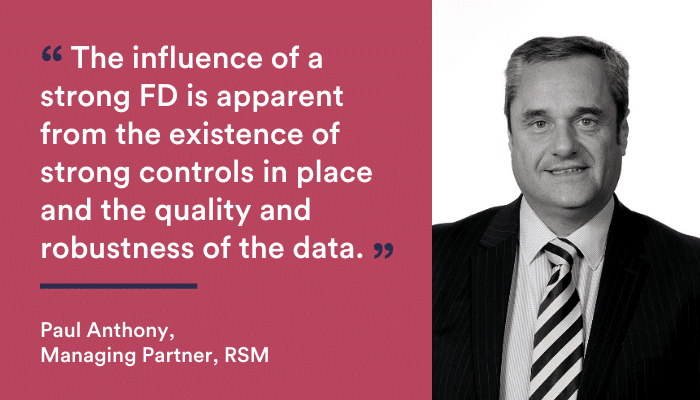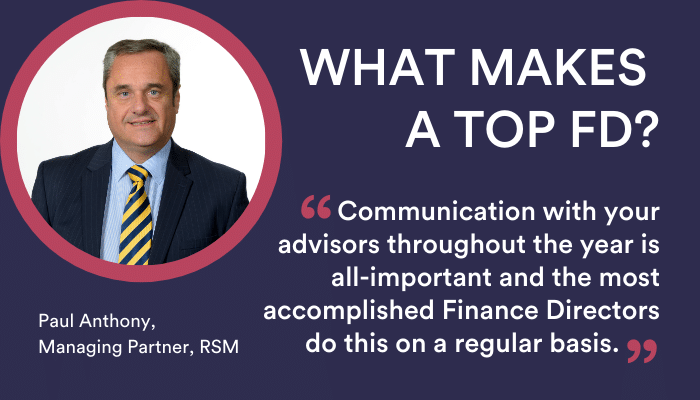What Makes a Top FD: The Chartered Accountant’s Viewpoint
In this series of articles, we speak to local business leaders and financial experts to discover the essential qualities and attributes needed to make it as a top Financial Director (FD).
For this instalment we spoke to Paul Anthony, Managing Partner at RSM to get a chartered accountant and audit partner’s perspective on what makes a top FD.
Paul has over 25 years of experience in the auditing profession and is Managing Partner of RSM’s Southern region. He advises businesses of various sizes including owner-managed companies as well as those backed by private equity. He has significant experience with complex and international audits and works with a broad range of clients in technology, distribution and manufacturing sectors.
In the course of his career, Paul has worked with many FDs, seeing the full range of poor, good and great leadership. In this series of articles we have been ascertaining the important attributes required to successfully fulfil the role of FD to maximum effect and we have found that the common theme is that it goes beyond just understanding the numbers: “In my opinion,” says Paul, “the good FDs understand the business inside out, they really get under the skin of the business.”
Paul explains that the numbers are just a snapshot – it’s about more than just reporting the financials: “It’s about understanding the main drivers for a business and the opportunities and risks they face.”
The role of Financial Director gives such a broad overview of the company that it’s not surprising that so many listed companies are led by former FDs. Paul says: “As a good FD, they almost prime themselves for taking on the MD/CEO position.”
Working with your accountant
The role of an FD is demanding irrelevant of the sector. But are there any sectors that are particularly challenging for an FD?
“Financial Services is a particularly complex sector, given the level of regulation and continued progression of this” says Paul. “The construction sector is also very challenging; it’s imperative to know the finer details of the various projects ongoing at any given time, managing supply and the all-important ‘cash management’.”
To overcome these challenges taking advice and asking for help is key. In Paul’s opinion, a great FD also knows when and how to take this support: “Knowing how to take advice early is also important, even if 90% of the time it is more to ‘sense check’.”
Paul advises FDs to foster a good relationship with their accountants and lean on their network and experience.
The impact of COVID-19
The impact of the pandemic has been wide reaching for businesses. Remote audits have thrown up some obvious hurdles for all concerned, with simple requests for information taking longer than previously.
Paul has noticed that during this time the FDs with highly engaged teams have been usually much quicker to provide deliverables. “They see the benefit the audit process brings, as opposed to it being simply a statutory responsibility.”
Moving forward, the likelihood of a hybrid audit model in the future is very strong, according to Paul – i.e. working from both the client’s office and remotely: “Covid-19 has proved the viability of this” he says.

Another challenge thrown up by COVID-19 has been related to fraud. Paul says: “Whenever we see any economic turmoil, more occurrences of fraud are uncovered. The robustness of controls to detect and prevent fraud come to the forefront of the organisation. This is a big area of focus for us.”
An evolving role
Technology is proving to be the biggest driver for change in the workplace for an FD, meaning it is essential for an FD to embrace and understand it: “I really believe we are on the cusp of something significant in terms of the speed of change within technology, with the very real prospect of automation bots and increased AI for some transactional responsibilities – for example, credit control processes and reconciliations.”
Paul feels technology will be a game-changer and will eventually transform the role of an FD: “The new accounting software is becoming so much more sophisticated, that less of the FD’s role will be overseeing general bookkeeping.”
With a greater focus on work flexibility and work-life balance, driven by the enforced remote working of the COVID-19 pandemic, attitudes and key drivers within the workforce have shifted and Paul predicts these will continue to evolve over the next few years.
“Businesses are establishing new ways of working. Moving forwards, teams working between home and the workplace will become the norm. The FD will need to embrace technology to enable this to happen effectively.”
Advice for aspiring FDs
We asked Paul for some final words of advice for aspiring FDs: “The phrase ‘Lonely at the top’ is so true of an FD and therefore the importance of building a network and using your advisors for help and advice is paramount.”
Inexperienced FDs who may not have this network yet can be more reticent about asking for advice, but Paul advises: “Communication with your advisors throughout the year is all-important and the most accomplished Finance Directors do this on a regular basis.”


